English
Live Chat
TestTrick
5 Best Personality Assessment Tools of TestTrick You Can Utilize for Hiring in 2026
Explore TestTrick’s personality assessment tools for better hiring. Evaluate traits, communication style, and job fit with validated psychometric tests.
By Tooba Noman
|
Updated on November 24, 2025
Table of Contents
Hiring in 2026 is no longer just about résumés and job titles. Recruiters want to know how people work, communicate, solve problems, and fit into a team. Interviews help, but they don’t always show how someone behaves under pressure or how they interact with others. That is why personality assessments have become an important part of the hiring process.
Most companies use well-known models like the Big Five, DISC, MBTI, and other personality types to understand behavior, motivation, and communication style. These tests reveal patterns you can’t see in an interview, such as decision-making tendencies, teamwork style, conflict response, and overall fit for the role.
In this guide, we look at the 5 best personality assessment tools you can use in 2026. Each one helps recruiters understand personality traits in a practical, hiring-focused way. TestTrick combines personality assessments with cognitive ability tests, situational judgment tasks, and role-related evaluations, all inside one workflow built for hiring teams.
Why Use Personality Assessments in Hiring?
Personality assessments help hiring teams look beyond résumés and understand how candidates actually behave in the workplace. They reveal personality traits, communication style, and decision-making tendencies that interviews alone often miss.
- Résumés don’t show behavioral tendencies, teamwork style, or how someone fits into existing team dynamics, but personality assessment tools do.
- Prevents poor culture fit, early attrition, and mismatched personality types that affect long-term performance.
- Predicts communication style, motivation, stress response, emotional intelligence, and daily work habits.
- Ideal for customer service, sales, leadership, and collaboration-heavy roles where relationship management and personality dimensions influence results.
TestTrick combines personality assessments with cognitive tests, situational judgment tests, and skills assessments, providing hiring teams with a comprehensive view of personality traits, cognitive diversity, and technical ability.
What to Look for in a Personality Assessment Tool?
Personality assessment tools should help recruiters understand real workplace behavior, not just broad personality types or quiz-style labels. The right tool connects personality traits to job performance, decision-making tendencies, and team dynamics.
1. Scientifically Valid Psychometric Frameworks
A good assessment relies on proven psychometric foundations such as the Big Five, work-style behavior models, or occupational personality profiles. These frameworks measure personality dimensions with stronger predictive validity than projective tests or informal self-assessments. Tools aligned with established psychology research, including references you might see on Psychology Today or Positive Psychology, give more reliable hiring signals.
2. Clear, Actionable Hiring Insights
Reports should be simple to read and link assessment scores directly to job expectations. Recruiters need short behavioral summaries, communication style indicators, and interpretation notes that support decisions about organizational behavior, employee satisfaction, and future team performance.
3. Integration With Multi-Skill Testing
Modern hiring blends personality tests with skills assessments, cognitive ability exams, and situational judgment tests. A strong tool brings these pieces together, allowing recruiters to view personality traits, cognitive diversity, and technical results in one place.
4. Bias Reduction & Standardization
Consistency matters. Structured self-report inventories with clear scoring reduce interviewer bias and limit “faking-good response style” behaviors. Standardized scoring across candidates also supports fairer evaluation and aligns with company policies.
5. Scalability & Bulk Testing
Personality assessments should be scalable, whether you are testing ten people or hundreds. Bulk testing, fast scoring, and organized psychological assessment tools help teams run high-volume hiring without slowing down user experience or the overall hiring process.
Best Personality Assessment Tools for Hiring in 2026
Choosing the right personality test depends on how deep you want to go and what traits matter most for the role. Some tools focus on quick personality types, while others offer fuller insight into behavior, communication, and team dynamics.
Here are the best personality assessment tools for hiring in 2026, starting with TestTrick.
1. TestTrick
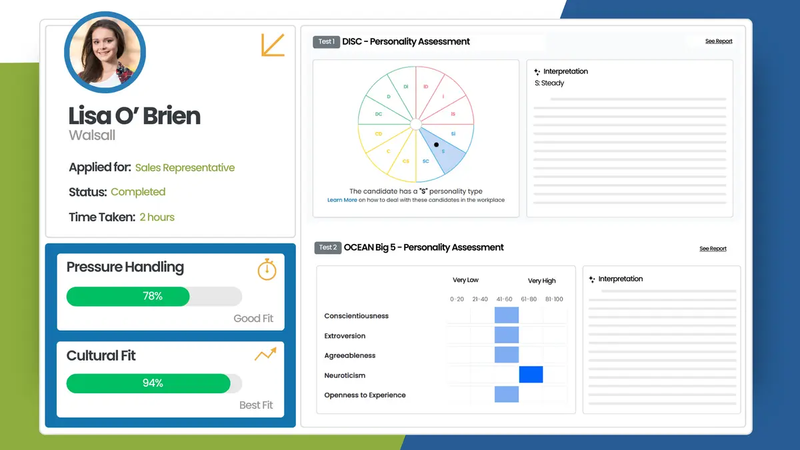
Best For: Hiring teams that want personality assessments, cognitive ability tests, and role skills evaluated in one place.
TestTrick offers a full library of personality tests based on the Big Five, DISC, and MBTI-style personality types. These assessments help recruiters understand personality traits linked to communication style, team dynamics, emotional intelligence, and workplace behavior. TestTrick also includes cognitive diversity checks through reasoning tests and uses self-report inventories with standardized scoring to reduce faking-good response style. All results appear in clear reports that connect psychological test findings to job fit.
Key Insights Provided:
- Collaboration tendencies
- Conflict-resolution behavior
- Adaptability and stress response
- Leadership and decision-making patterns
- Personality dimensions and big five factors of personality
- Workplace communication patterns
Why It’s Important:
TestTrick gives hiring teams a full picture of how someone works, thinks, and interacts. This helps reduce hiring mistakes, improves team productivity, and supports decisions about customer service, leadership, and organizational behavior.
2. TestGorilla
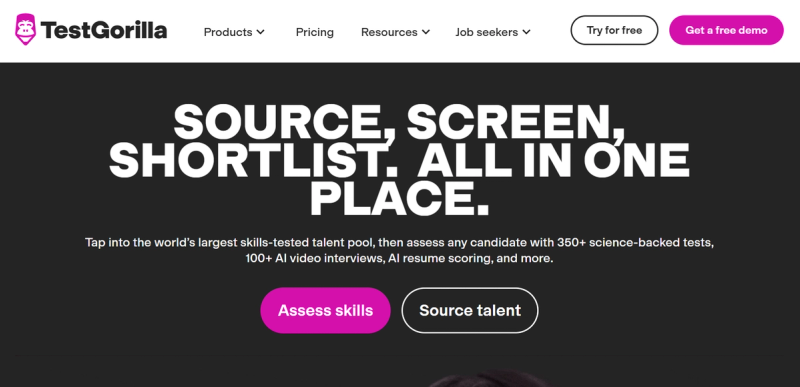
Best For: Companies that want quick personality tests with basic reporting for early-stage screening.
TestGorilla offers several personality tests, including 16 Personalities, Big Five Personality Test, and other self-report inventories. These tests help identify personality traits such as communication style, decision-making tendencies, and workplace preferences. The platform focuses on short assessments that highlight personality types and basic behavioral patterns. It also includes some cognitive diversity checks, though the insights are less detailed.
Key Insights Provided:
- 16 Personalities type overview
- Big Five factors of personality
- Motivators and stress triggers
- General team dynamics patterns
Why It’s Important:
TestGorilla provides teams with a simple way to understand personality dimensions before moving deeper into the hiring process. It supports basic psychological assessment tools without requiring long setup steps.
3. Testlify
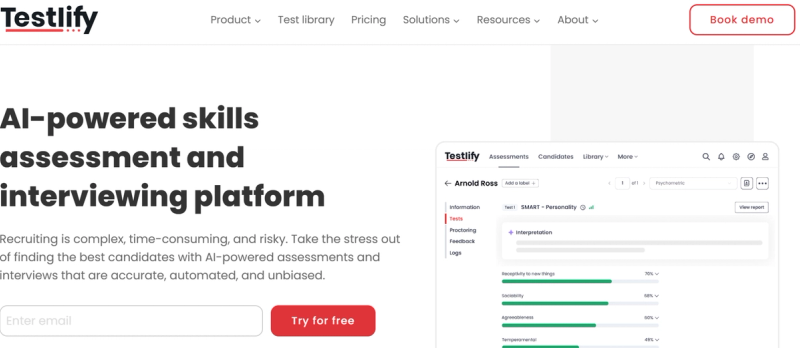
Best For: Teams that want short personality tests paired with quick behavioral summaries.
Testlify offers Smart Personality Assessment that measures personality traits, personality dimensions, and communication style using a structured self-report format. The test highlights how candidates approach teamwork, motivation, and decision-making tendencies. It also connects results to common personality types, giving recruiters a broad view of behavioral patterns.
Key Insights Provided:
- Workstyle preferences
- Relationship management behaviors
- Stress-response signals
- Team dynamics alignment
- Emotional intelligence indicators
Why It’s Important:
Testlify helps hiring teams understand basic behavior patterns early in the hiring process. This supports better screening for customer service roles, organizational behavior needs, and general team performance expectations.
4. Bryq
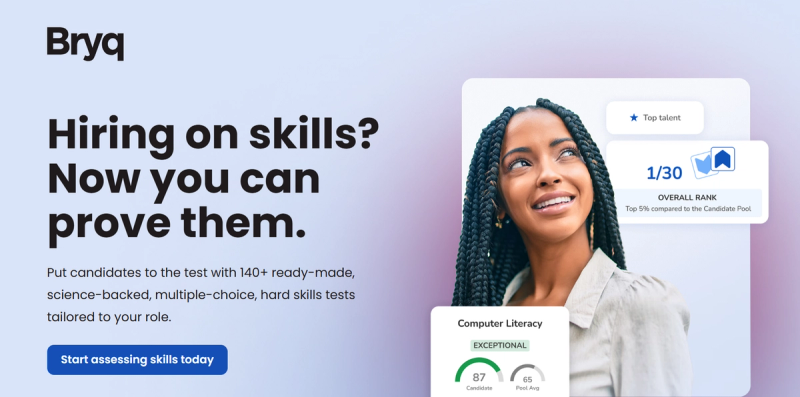
Best For: Companies that want personality tests combined with cognitive diversity and job-fit matching.
Bryq uses a psychology-backed model that blends personality traits, cognitive scores, and behavior indicators to predict job fit. It pulls from frameworks similar to the Big Five, 16PF-style personality dimensions, and occupational behavior patterns. The assessment highlights communication style, emotional intelligence signals, and workplace tendencies that affect team dynamics and employee satisfaction.
Key Insights Provided:
- Personality dimensions and job-fit indicators
- Emotional intelligence patterns
- Decision-making tendencies
- Team dynamics and collaboration style
- Behavioral risks and motivators
Why It’s Important:
Bryq is useful for understanding how personality connects to career success and long-term performance. It helps teams identify people who communicate well, adapt quickly, and fit the company’s workstyle.
5. Criteria Corp
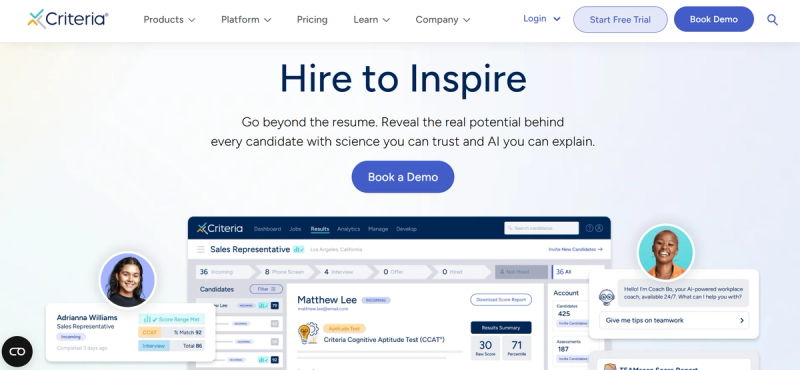
Best For: Organizations that want personality tests tied to job performance research and long-term employee satisfaction.
Criteria Corp offers personality assessments such as the 16PF Personality Questionnaire and other psychological assessment tools that align with the Big Five factors of personality. These tests measure personality traits connected to communication style, relationship management, decision-making tendencies, and stress handling. Criteria also provides self-report inventories with predictive validity, helping teams understand behavioral risks, team dynamics, and organizational behavior patterns.
Key Insights Provided:
- Big Five personality dimensions
- Emotional intelligence indicators
- Workplace behavior and motivation
- Collaboration and customer service tendencies
- Decision-making style and task preferences
Why It’s Important:
Criteria Corp helps teams identify candidates who work well with others, stay consistent under pressure, and contribute to overall team productivity. It supports better hiring decisions, especially for roles that depend on clear communication and steady workplace behavior.
Comparison Table: Top Personality Tools at a Glance
| TestTrick | Key Strength | Best For | Core Offerings |
| TestTrick | Strong mix of personality assessments, cognitive ability tests, and situational judgment tasks | All roles, especially customer service, leadership, sales, marketing, and team-focused jobs | Big Five, DISC, MBTI-style personality types, personality traits scoring, personality dimensions, emotional intelligence signals, decision-making tendencies, workplace behavior reports |
| TestGorilla | Quick screening with basic personality types | Early screening for general roles | 16 Personalities, Big Five Personality Test, self-report inventories, basic communication style insights |
| Testlify | Simple personality summaries with short tests | Fast hiring cycles and high applicant volume | Workstyle indicators, relationship management traits, team dynamics overview, emotional intelligence |
| Bryq | Blend of personality traits and cognitive diversity | Roles needing job-fit matching and behavioral prediction | Personality dimensions, EI patterns, decision-making tendencies, motivators, team alignment signals |
| Criteria Corp | Predictive validity and structured psychological test options | Roles requiring deeper workplace behavior analysis | 16PF Personality Questionnaire, Big Five style scoring, stress-handling patterns, collaboration and customer service traits |
Frequently Asked Questions (FAQ)
Q1. Why are personality assessments important in 2026 hiring?
Personality assessments help predict behavior, communication style, team fit, and long-term career success. They add context that skills tests can’t provide, improving decision-making across the hiring process.
Q2. Does TestTrick offer validated personality tests?
Yes. TestTrick utilizes scientifically grounded psychometric frameworks and personality dimensions based on proven models, such as the Big Five, providing recruiters with reliable, bias-reduced results for workplace evaluations.
Q3. Can I combine personality tests with skill assessments?
Yes. TestTrick combines personality assessments with cognitive ability tests, technical tasks, and Situational Judgment Tests, helping teams evaluate decision-making tendencies, cognitive diversity, and job readiness together.
Q4. Which roles benefit most from personality testing?
Customer support, sales, marketing, admin, and management roles benefit the most because personality traits, Emotional Intelligence, and relationship management directly influence performance and team dynamics.
Q5. How does TestTrick interpret results?
TestTrick converts assessment scores into clear summaries showing personality traits, communication style, and job fit. Recruiters see easy-to-read insights linked to organizational behavior and role suitability.
Contact Us
FlyPearls LLC. 8 The Green # 4367 Dover, DE 19901 United States
+1 302 261 5361